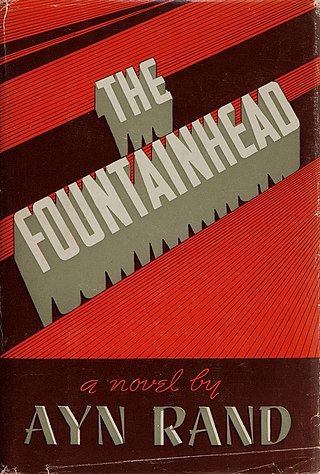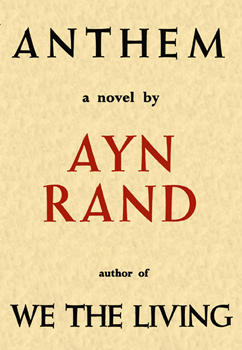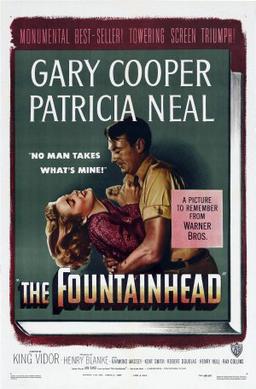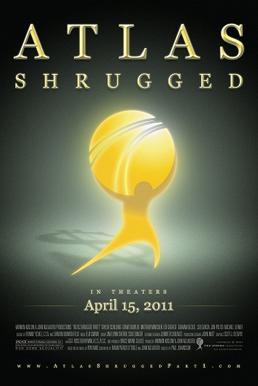
Alice O'Connor, better known by her pen name Ayn Rand, was a Russian-born American author and philosopher. She is known for her fiction and for developing a philosophical system she named Objectivism. Born and educated in Russia, she moved to the United States in 1926. After two early novels that were initially unsuccessful and two Broadway plays, Rand achieved fame with her 1943 novel The Fountainhead. In 1957, she published her best-selling work, the novel Atlas Shrugged. Afterward, until her death in 1982, she turned to non-fiction to promote her philosophy, publishing her own periodicals and releasing several collections of essays.

The Fountainhead is a 1943 novel by Russian-American author Ayn Rand, her first major literary success. The novel's protagonist, Howard Roark, is an intransigent young architect who battles against conventional standards and refuses to compromise with an architectural establishment unwilling to accept innovation. Roark embodies what Rand believed to be the ideal man, and his struggle reflects Rand's belief that individualism is superior to collectivism.

Anthem is a dystopian fiction novella by Russian–American writer Ayn Rand, written in 1937 and first published in 1938 in the United Kingdom. The story takes place at an unspecified future date when mankind has entered another Dark Age. Technological advancement is now carefully planned and the concept of individuality has been eliminated. A young man known as Equality 7-2521 rebels by doing secret scientific research. When his activity is discovered, he flees into the wilderness and is followed by Liberty 5-3000, a woman he loves. Together they plan to establish a new society based on rediscovered individualism.

We the Living is the debut novel of the Russian American novelist Ayn Rand. It is a story of life in post-revolutionary Russia and was Rand's first statement against communism. Rand observes in the foreword that We the Living was the closest she would ever come to writing an autobiography. Rand finished writing the novel in 1934, but it was rejected by several publishers before being released by Macmillan Publishing in 1936. It has since sold more than three million copies.

The Ayn Rand Institute: The Center for the Advancement of Objectivism, commonly known as the Ayn Rand Institute (ARI), is a 501(c)(3) nonprofit think tank in Santa Ana, California, that promotes Objectivism, the philosophy developed by Ayn Rand. The organization was established in 1985, three years after Rand's death, by businessman Ed Snider and Leonard Peikoff, Rand's legal heir.

The Early Ayn Rand: A Selection from Her Unpublished Fiction is an anthology of unpublished early fiction written by the philosopher Ayn Rand, first published in 1984, two years after her death. The selections include short stories, plays, and excerpts of material cut from her novels We the Living and The Fountainhead.
The Randian hero is a ubiquitous figure in the fiction of 20th-century novelist and philosopher Ayn Rand, most famously in the figures of The Fountainhead's Howard Roark and Atlas Shrugged's John Galt. Rand's self-declared purpose in writing fiction was to project an "ideal man"—a man who perseveres to achieve his values, and only his values.
Andrew Bernstein is an American philosopher. He is a proponent of Objectivism, the philosophy of Ayn Rand, and the author of several books, both fiction and non-fiction.

Paul Johansson is an American-born Canadian actor and director in film and television, best known for playing Dan Scott on the WB/CW series, One Tree Hill, The Notebook and for his role as Nick Wolfe on the short lived Highlander: The Series spin-off Highlander: The Raven. He directed the 2011 film adaptation of Ayn Rand's novel, Atlas Shrugged: Part I.

The Fountainhead is a 1949 American black-and-white drama film produced by Henry Blanke, directed by King Vidor, and starring Gary Cooper, Patricia Neal, Raymond Massey, Robert Douglas and Kent Smith. The film is based on the bestselling 1943 novel of the same name by Ayn Rand, who also wrote the adaptation. Although Rand's screenplay was used with minimal alterations, she later criticized the editing, production design and acting.

Atlas Shrugged: Part I is a 2011 American political science fiction drama film directed by Paul Johansson. An adaptation of part of the philosopher Ayn Rand's 1957 novel of the same name, the film is the first in a trilogy encompassing the entire book. After various treatments and proposals floundered for nearly 40 years, investor John Aglialoro initiated production in June 2010. The film was directed by Paul Johansson and stars Taylor Schilling as Dagny Taggart and Grant Bowler as Hank Rearden.
Think Twice may refer to:

Erika Holzer was an American novelist and essayist who was a close associate of Ayn Rand. Her novel Eye for an Eye was the basis for a major motion picture of the same name. She also co-authored two nonfiction books with her husband, professor of law Henry Mark "Hank" Holzer.

Atlas Shrugged is a 1957 novel by Ayn Rand. It is her longest novel, the fourth and final one published during her lifetime, and the one she considered her magnum opus in the realm of fiction writing. She described the theme of Atlas Shrugged as "the role of man's mind in existence" and it includes elements of science fiction, mystery and romance. The book explores a number of philosophical themes from which Rand would subsequently develop Objectivism, including reason, property rights, individualism, libertarianism and capitalism, and depicts what Rand saw as the failures of governmental coercion. Of Rand's works of fiction, it contains her most extensive statement of her philosophical system.

Ayn Rand: A Sense of Life is a 1996 American documentary film written, produced, and directed by Michael Paxton. Its focus is on novelist and philosopher Ayn Rand, the author of the bestselling novels The Fountainhead and Atlas Shrugged, who promoted her philosophy of Objectivism through her books, articles, speeches, and media appearances.

We the Living is a two-part 1942 Italian romantic war drama film, based on Ayn Rand's 1936 novel of the same name. It was originally released as two films, Noi vivi and Addio Kira. It was directed by Goffredo Alessandrini and produced by Scalera Film, and stars Alida Valli as Kira Argounova, Rossano Brazzi as Leo Kovalensky, and Fosco Giachetti as Andrei Taganov.

Duncan Scott is a film and television writer, director, and producer. Scott was one of the screenwriters of Atlas Shrugged: Part II and Atlas Shrugged: Part III. Early in his career, he became involved in the restoration of the 1942 film We the Living, a project that he continued to be involved in over the next several decades. Scott also directed and produced for television, winning several Emmy and Telly Awards, as well as being nominated for a Peabody Award.

The Unconquered is a three-act play written by Russian-American author Ayn Rand as an adaptation of her 1936 novel We the Living. The story follows Kira Argounova, a young woman living in the Soviet Union in the 1920s. Her lover Leo Kovalensky develops tuberculosis. To get money for his treatment, Kira has an affair with a Communist official, Andrei Taganov. After recovering from his illness, Leo becomes involved with black market food sales that Andrei is investigating. When Andrei realizes that Kira loves Leo, he helps his rival avoid prosecution, then commits suicide. Leo leaves Kira, who decides to risk her life escaping the country.














